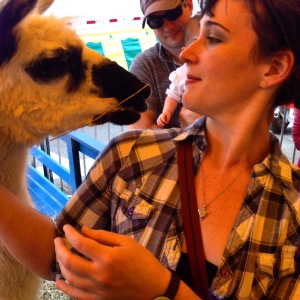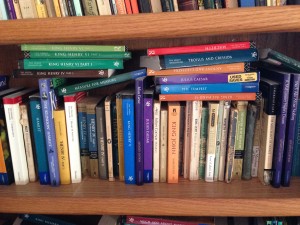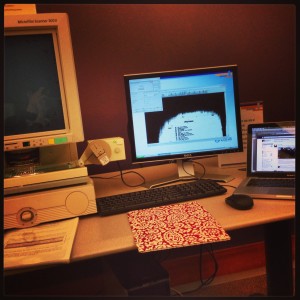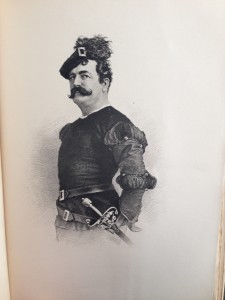So I’ve been working on my dissertation almost specifically these days (I say “almost” because I still have a few side-projects going on, including my ongoing work with the Folger Shakespeare Library and some of their digital initiatives, but that’s probably a tale best told later). I’m only teaching one class this semester (my continuing adult ed. class for OSHER lifelong learning), and it’s a very odd thing.
It’s odd because I’m working almost entirely on my own time. I have nominal amounts of meetings, and deadlines are pretty hazy. It’s odd because I don’t have to set an alarm if I don’t want to, because if I sleep in a little bit it just means that I have to work a little later that day. It’s odd because I have lost almost entire sense of what day of the week it is and how that effects the rest of the world (let me tell you what it’s like to try and make appointments with businesses or doctors when you have small sense of “normal people time”). And it’s odd because I spend all day, every day, all alone with my thoughts. It’s true. If I didn’t cohabitate with another human being, I would go LONG SPANS without making eye contact or speaking with another human without the interference of an electronic device.
So how can one possibly hope to succeed under these conditions?
Well, I’ve set up some pretty strict regulations for myself to ensure that work gets done and, so far, it seems to be working.
1) I sit at my desk to work. After breakfast, I put down the iPad and phone, and go plant myself at my desk. And that’s where I stay until lunch. I allow myself an hour for lunch, then I sit back at my desk until it’s an appropriate time to end the day. I also allow myself a break to work out when I’m in true brain-fry space; but when I’m back and showered, I sit back down at the desk. If I’m reviewing a show in the evening, or going to a rehearsal, or doing some other kind of legitimate work, I let myself “leave” a bit early just to provide enough cool-down time between jobs. But other than that, I regulate my desk habits. I find that if I don’t, I spend more time cleaning my apartment than conducting research.
2) I set micro-goals. Every day, before I leave my desk, I try to give myself a sense of what needs to be accomplished the next day. Whether that’s “read this stack of books”, or “finish drafting another draft of this chapter”. I always try to visually represent these goals for myself because otherwise the things I do become too theoretical to make me feel accomplished. Sometimes this means setting out a stack of books for myself that I’m allowed to move to the “done” pile when I finish them. Sometimes it means leaving the red pen on top of my draft so that I know it’s time for drafting. Sometimes it means writing a list that I can cross off when I’ve completed tasks. Whatever it is, I make sure to give myself the satisfaction of literally seeing accomplishment on a daily basis. This keeps my morale high, and also gives me a sense of my pace and what I can reasonably expect from myself in a day.
3) I update my social media feeds. I know that, for some people, this can be a time-suck and a distraction rather than a boon, but for me it’s really refreshing to be able to post about funny things I read in my research books, or small accomplishments throughout the day. Also, it keeps my twitter feed relevant and, as a result, refreshes the content on my blog which is directly linked to my SEO. In other words: it kills a lot of marketing birds while simultaneously making me feel connected with the outside world. I do make sure that, once I’ve posted my update, I minimize my browser windows and turn my phone upside down on
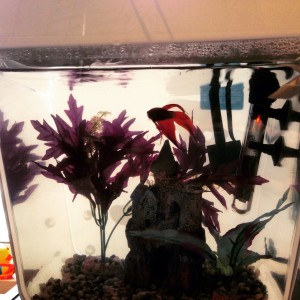
This guy helps. He’s my new office buddy: Sir Henslowe Fishigills; First of his Name; Lord of all the waters he swims
my desk. This way, I have to work to become re-distracted by whatever’s going on on the internet.
4) I evaluate situations fairly, but I don’t take excuses. Since I’m essentially my own boss, I don’t let myself off easy. I think this is probably a personality trait that most at the Candidacy stage share (if not, you probably wouldn’t have successfully reached Candidacy). That said, there are sometimes things that will happen which will prevent productivity for a short time. This winter, I’ve been dealing with some car troubles (for example) that will sometimes take me away from my desk for longer than I’d like. On days when I am stuck out waiting, I take as much work as is feasible with me (pre-planning helps with this), but I also don’t beat myself up because I couldn’t read two books instead of one while waiting at the garage. Know your limits, know your work habits, and know when it’s acceptable to push and when it’s acceptable to slack a little. Also have a plan for when/how you’ll be able to make up missed work at a later date.
5) I combat anxiety at every turn. There are some well known psychological consequences to writing a dissertation. Imposter syndrome, stress, anxiety, and occasional bouts of depression pretty much come with the territory (no, really, they’ve done studies on it). Learning to manage these things for yourself is a personal journey that you’re going to have to accept and grow with. Understanding for myself, what helped, what didn’t, and who I could turn to for what kind of help was HUGE in terms of my productivity. Find your allies, find your coping mechanisms, and use them repeatedly and often.
6) I take care of myself. I’m writing a dissertation. This is probably the biggest thing I’ve so far done in my entire life. It’s a hugely taxing endeavor mentally and physically. In order to get it done, I need to feel my best; and in order to feel my best I need to eat right, work out, drink plenty of water, and get enough sleep. Period. Nothing comes in the way of those things for me (and if it threatens to, I execute it before it executes me). You have to make you a priority; even though it means sacrificing things you might want to be doing (like… say… social engagements).
7) Weekends are weekends. I don’t work on the weekends. I try not to even turn my computer on on the weekends. I am entitled to two days off a week (…I will often review a show or FD a project on the weekends, but to me this doesn’t really count as “work” in the same way as working on my dissertation does). The point is this: it doesn’t matter what your boundaries are, just find them and stick to them.
Those are the big ones for me, but obviously everyone is different. Keep on plugging; that’s the real trick. I hope that your writing is going as well as mine is! Stay warm out there, everybody!




